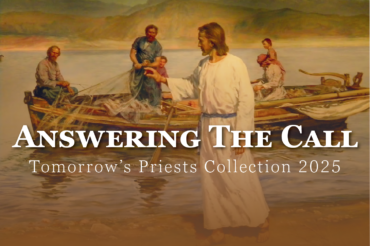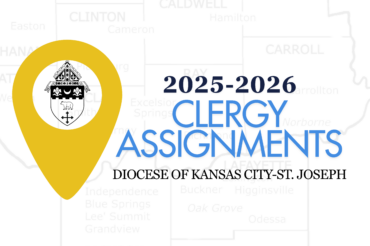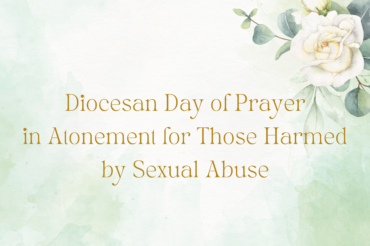Proof of God’s Love
The Resurrection by Sebastiano Ricci, circa 1715. Oil on canvas, Dulwich Picture Gallery.

God’s Word in Everyday Living
Deacon Scott McKellar
Pharisees and scribes frequently confront Jesus in the Gospels, but in this passage, Sadducees question him. The Sadducees were the Palestinian aristocracy who took the name of their party from Zadok, the high priest at the time of David and of Solomon.
The Jewish historian Josephus tells us that the Sadducees claimed that the soul perished along with the body at death. St. Luke confirms this point describing the Sadducees as, “those who deny that there is a resurrection” (Luke 20:27). The Sadducees favored the first five books of the Bible, and denied the existence of angels (Acts 23:7–8).
The Sadducees confront Jesus with a dilemma story, which they use to disprove the resurrection. According to the laws of Levirate marriage (Genesis 38, Deuteronomy 25:5–10), if a married man died childless, his brother was required to marry his widow and to produce a male child. “The firstborn son she bears shall continue the name of the deceased brother” (Deuteronomy 25:6).
This type of marriage was a popular as means of caring for widows and securing property rights. Arranged marriages at this time had more to do with land, inheritance, and kinship bonds, than with mutual love.
Using the laws of Levirate marriage, the Sadducees present an absurd dilemma to trap Jesus. What would happen if a certain widow married a second time to her bother-in-law, and then he in turn died childless? In the Sadducees story, the widow eventually marries seven brothers, each of whom dies childless. Finally, the woman herself dies.
Attempting to make their point, the Sadducees ask, “Now at the resurrection whose wife will that woman be? For all seven had been married to her.” The Sadducee’s believe this line of argument proves that the resurrection is a ludicrous idea.
Jesus counters by first pointing out that the dead who rise will “neither marry nor are given in marriage.” Again, reaching across different cultures, the primary purpose of marriage in the ancient world was the production of children. The dead who rise will no longer die, so Jesus says they will be ‘like’ or ‘equal to’ the angels who also never die and have no need to produce children to perpetuate their kind.
What does Jesus mean when he says the resurrected children of God are like angels? In popular culture, it is common to tell someone who has recently lost a love one that they “now have an angel in heaven.” God created angels as beings of pure spirit. Unlike angels, humans have a body and a soul. Although our body temporarily separates from our soul at death, this is not our final state. At the resurrection of the dead, our souls will be reunited with eternal resurrected bodies.
Although our transformed bodies will be very different from our present bodies (1 Corinthians 15:35–58), we will still spend eternity not as spirits but in bodily existence. Jesus says we will be like angels because we will never die, not because we become angels. Since we will no longer die, marriage is not necessary in our heavenly existence.
Jesus then uses Scripture to answer the Sadducees. He could have quoted Daniel 12:2-3, which is a clear reference to the resurrection, but since the Sadducees especially reverenced the traditions of Moses, Jesus makes his point from Exodus. In the narrative at the burning bush the Lord says, “I am the God of Abraham . . . of Isaac . . . and of Jacob.” (Exodus 3:2–6). Jesus says God “is not God of the dead, but of the living, for to him all are alive” (Luke 20:38).
What does this encounter with Jesus mean to us today? First, many people in our modern world treat religious doctrine and dogma, as an infringement on their personal right to choose whatever beliefs they want. They simply seek to be ‘spiritual’ in their own way. Does it really matter to Jesus what we believe about the resurrection? Based on this Gospel, we would have to say; “Yes, the resurrection matters to Jesus.”
St. Paul writes to the Corinthians, if Christ is not raised from the dead, our faith is in vain (1 Corinthians 15:16-18). Without the resurrection our faith is a fraud and meaningless! Why is this the case? The resurrection teaches us three central things about our faith. First, the resurrection demonstrates God’s love for us. Secondly, it is through the resurrection we have eternal life, and finally the resurrection holds us each accountable before God’s judgment.
Christ demonstrates both his desire for connection and his personal vulnerability, by taking the initiative in sharing his love with us. God’s love is a gift, which we do not have to earn. St. Paul writes, “But God proves his love for us in that while we were still sinners Christ died for us” (Romans 5:8).
Not only is the resurrection a proof of God’s love, it is also the means of eternal life for us. Jesus humbled himself taking on human flesh so that he might become “obedient to death, even death on a cross” (Philippians 2:8) and after this to rise to newness of life and to share that life with us in baptism (Romans 6:4).
Finally, if death is simply the end of our existence and there is nothing else, then there is no accountability. Without the resurrection, who cares! We simply cease to exist.
On the contrary, we confess in the creed, “He will come again in glory to judge the living and the dead.” Love is always our starting place, and even though we were each chosen for adoption as God’s children before the foundation of the world (Ephesians 1:4), we are still held accountable for our own freely chosen actions in this world.
In truth, nothing could be more central to our faith than the resurrection. God reveals his love and manifests his power to save us on the cross and through Christ rising from the dead. Duty may induce us to some actions, but love will move us to selfless sacrifice. “For the love of Christ impels us, once we have come to the conviction that one died for all; therefore, all have died. . . . so that those who live might no longer live for themselves but for him who for their sake died and was raised” (2 Corinthians 5:14–15).
Deacon Scott McKellar is pastoral associate at St. Therese Parish, North.
For this Sunday’s scripture readings and readings throughout the year, visit the USCCB website.





